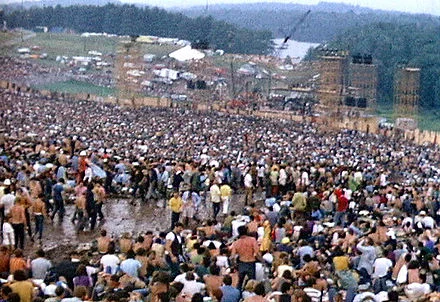Fun in the mud in Woodstock
From Robert Whitcomb’s “Digital Diary,’’ in GoLocal24.com
Some of the elderly commentariat has turned to the 50th anniversary of “Woodstock,’’ that Aug. 15-Aug 18, 1969 musicale and bacchanal in Bethel, N.Y. The spectacle, which produced many, many photos of attendees in the mud as they listened to rock stars, has of course become listed as one of the great epochal events of the “Sixties’’ (which as a cultural phenomenon might be said to have begun after the assassination of John F. Kennedy, on Nov. 22, 1963, and ended with Richard Nixon’s resignation on Aug. 8, 1974). I can well imagine how boring many Millennials must find stories about Woodstock.
Woodstock, which happened at the tail end of Sixties prosperity, didn’t change much of anything. The late adolescents and young adults there moved on to get mostly conventional jobs and to raise families. Whatever the alleged “peace and love’’ elements, the “Woodstock Generation’’ turned out to be perhaps greedier and more self-absorbed, and less civic-minded, than their parents’ generation, if less bigoted on such matters as race and sexual preference and more open to equality for women. Still, Woodstock itself was admirably affable and peaceful, friends who were there told me. I suspect that some Boomers’ frequent references to the spectacle bespeak a desire to place themselves in a comforting cohort, and in history, a kind of anchoring, as they move into their last innings.
I am in that generation. Still in college, I had a summer job as a news assistant at the now long-dead tabloid the Boston Record American. I had no plans to go into journalism. The job, in the Record’s mostly unairconditioned (fans and salt tablets instead) but beautiful stone building in downtown Boston, was a lifeline for me when another summer job fell through at the last minute.
When word arrived in the smoky newsroom about “Woodstock,’’ the general reaction by the mostly gruff and Irish-and-Italian-American staff was that the event was just another stretch of idiocy by spoiled kids. “Why aren’t they working?” The reporters seemed to be far more interested in the continuing drama of what had come to be called simply “Chappaquiddick’’ on July 18 of that busy summer, in which Sen. Edward Kennedy drove off that infamous bridge, resulting in the drowning of his young woman passenger, Mary Jo Kopechne. (When I asked my father what Kennedy was up to, he replied: “He was looking for a soft dune.’’)
And my news room colleagues didn’t even seem to be very interested in the moon landing, which had come on July 18. Nothing could beat an old-fashioned scandal involving Massachusetts’s Royal Family.











